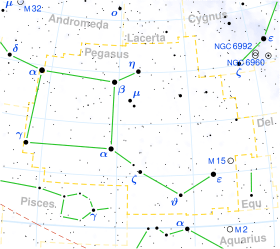55 Pegasi
55 Pegasi is a single[11] star in the northern constellation of Pegasus. It is visible to the naked eye as a faint, reddish-hued point of light with a baseline apparent visual magnitude of 4.51.[2] The star is located approximately 302 light years away from the Sun based on parallax,[1] but it is moving closer with a radial velocity of −5 km/s.[5]
| Observation data Epoch J2000 Equinox J2000 | |
|---|---|
| Constellation | Pegasus |
| Right ascension | 23h 07m 00.25899s[1] |
| Declination | 9° 24′ 34.1741″[1] |
| Apparent magnitude (V) | 4.51[2] |
| Characteristics | |
| Evolutionary stage | AGB |
| Spectral type | M1IIIab[3] |
| U−B color index | +1.88[2] |
| B−V color index | +1.58[2] |
| Variable type | suspected[4] |
| Astrometry | |
| Radial velocity (Rv) | −5.34[5] km/s |
| Proper motion (μ) | RA: +6.41[6] mas/yr Dec.: –12.71[6] mas/yr |
| Parallax (π) | 10.7831 ± 0.2694[1] mas |
| Distance | 302 ± 8 ly (93 ± 2 pc) |
| Absolute magnitude (MV) | –0.48[7] |
| Details[8] | |
| Mass | 1.61±0.13 M☉ |
| Radius | 45.87+1.31 −1.38 R☉ |
| Luminosity | 483.1±37.2 L☉ |
| Surface gravity (log g) | 0.80 cgs |
| Temperature | 3,994±50 K |
| Metallicity [Fe/H] | 0.23 dex |
| Rotational velocity (v sin i) | 3.8±1.5[9] km/s |
| Age | 2.13±0.46 Gyr |
| Other designations | |
| Database references | |
| SIMBAD | data |
This is an aging red giant star on the asymptotic giant branch[12] with a stellar classification of M1IIIab,[3] having exhausted the supply of hydrogen at its core then expanded to 46 times the Sun's radius. It is a suspected variable, with an observed magnitude that ranges from 4.50 down to 4.56.[4] The star is around two billion years old with 1.6 times the mass of the Sun. It is radiating 483 times the luminosity of the Sun from its swollen photosphere at an effective temperature of 3,994 K.[8]
References
- Brown, A. G. A.; et al. (Gaia collaboration) (August 2018). "Gaia Data Release 2: Summary of the contents and survey properties". Astronomy & Astrophysics. 616. A1. arXiv:1804.09365. Bibcode:2018A&A...616A...1G. doi:10.1051/0004-6361/201833051. Gaia DR2 record for this source at VizieR.
- Ducati, J. R. (2002). "VizieR Online Data Catalog: Catalogue of Stellar Photometry in Johnson's 11-color system". CDS/ADC Collection of Electronic Catalogues. 2237. Bibcode:2002yCat.2237....0D.
- Keenan, Philip C.; McNeil, Raymond C. (1989), "The Perkins catalog of revised MK types for the cooler stars", Astrophysical Journal Supplement Series, 71: 245, Bibcode:1989ApJS...71..245K, doi:10.1086/191373.
- Watson, C. L. (2006). "The International Variable Star Index (VSX)". The Society for Astronomical Sciences 25th Annual Symposium on Telescope Science. Held May 23–25. 25: 47. Bibcode:2006SASS...25...47W.
- Famaey, B.; et al. (2005). "Local kinematics of K and M giants from CORAVEL/Hipparcos/Tycho-2 data". Astronomy & Astrophysics. 430: 165. arXiv:astro-ph/0409579. Bibcode:2005A&A...430..165F. doi:10.1051/0004-6361:20041272.
- Van Leeuwen, F. (2007). "Validation of the new Hipparcos reduction". Astronomy and Astrophysics. 474 (2): 653. arXiv:0708.1752. Bibcode:2007A&A...474..653V. doi:10.1051/0004-6361:20078357. Vizier catalog entry
- Anderson, E.; Francis, Ch. (2012). "XHIP: An extended hipparcos compilation". Astronomy Letters. 38 (5): 331. arXiv:1108.4971. Bibcode:2012AstL...38..331A. doi:10.1134/S1063773712050015. Vizier catalog entry
- Baines, Ellyn K.; et al. (2018). "Fundamental Parameters of 87 Stars from the Navy Precision Optical Interferometer". The Astronomical Journal. 155. 30. arXiv:1712.08109. Bibcode:2018AJ....155...30B. doi:10.3847/1538-3881/aa9d8b.
- Zamanov, R. K.; et al. (October 2008). "Rotational velocities of the giants in symbiotic stars - III. Evidence of fast rotation in S-type symbiotics". Monthly Notices of the Royal Astronomical Society. 390 (1): 377–382. arXiv:0807.3817. Bibcode:2008MNRAS.390..377Z. doi:10.1111/j.1365-2966.2008.13751.x.
- "55 Peg". SIMBAD. Centre de données astronomiques de Strasbourg. Retrieved 2019-07-01.
- Eggleton, P. P.; Tokovinin, A. A. (2008). "A catalogue of multiplicity among bright stellar systems". Monthly Notices of the Royal Astronomical Society. 389 (2): 869. arXiv:0806.2878. Bibcode:2008MNRAS.389..869E. doi:10.1111/j.1365-2966.2008.13596.x.
- Eggen, Olin J. (July 1992). "Asymptotic giant branch stars near the sun". Astronomical Journal. 104 (1): 275–313. Bibcode:1992AJ....104..275E. doi:10.1086/116239.
